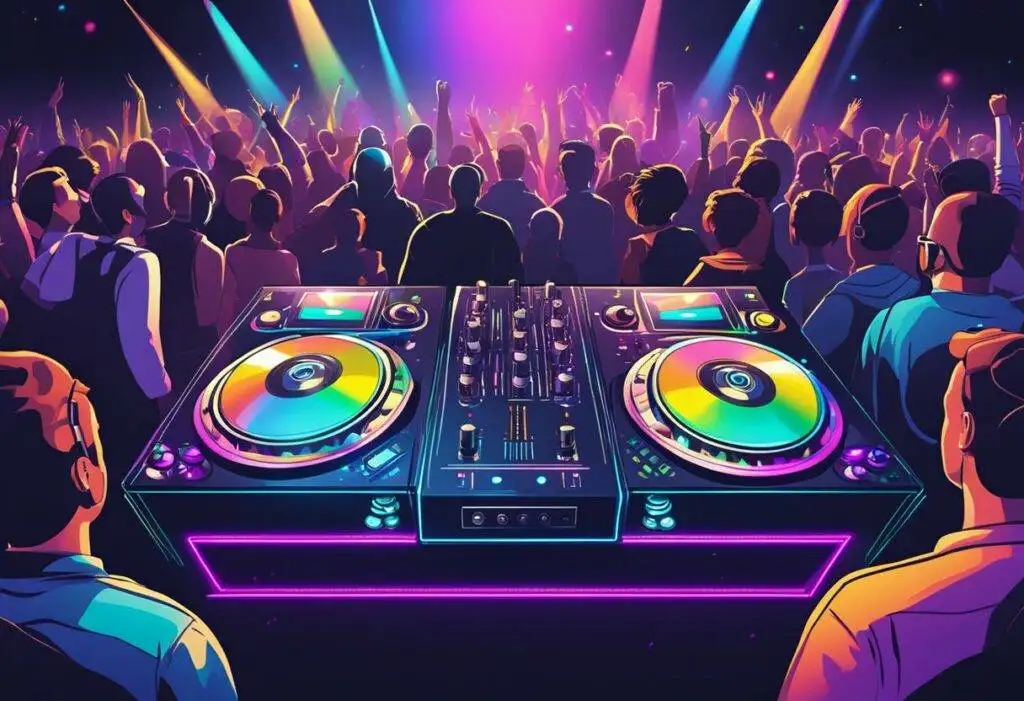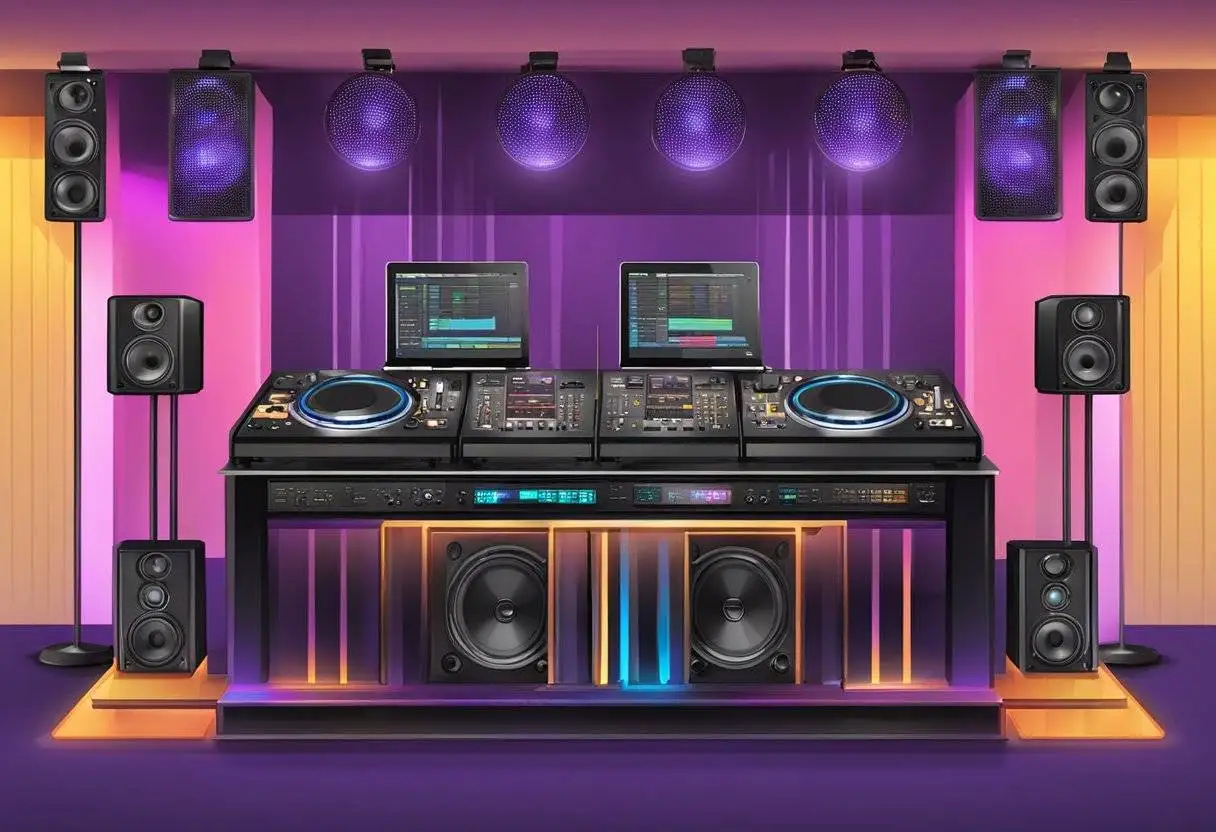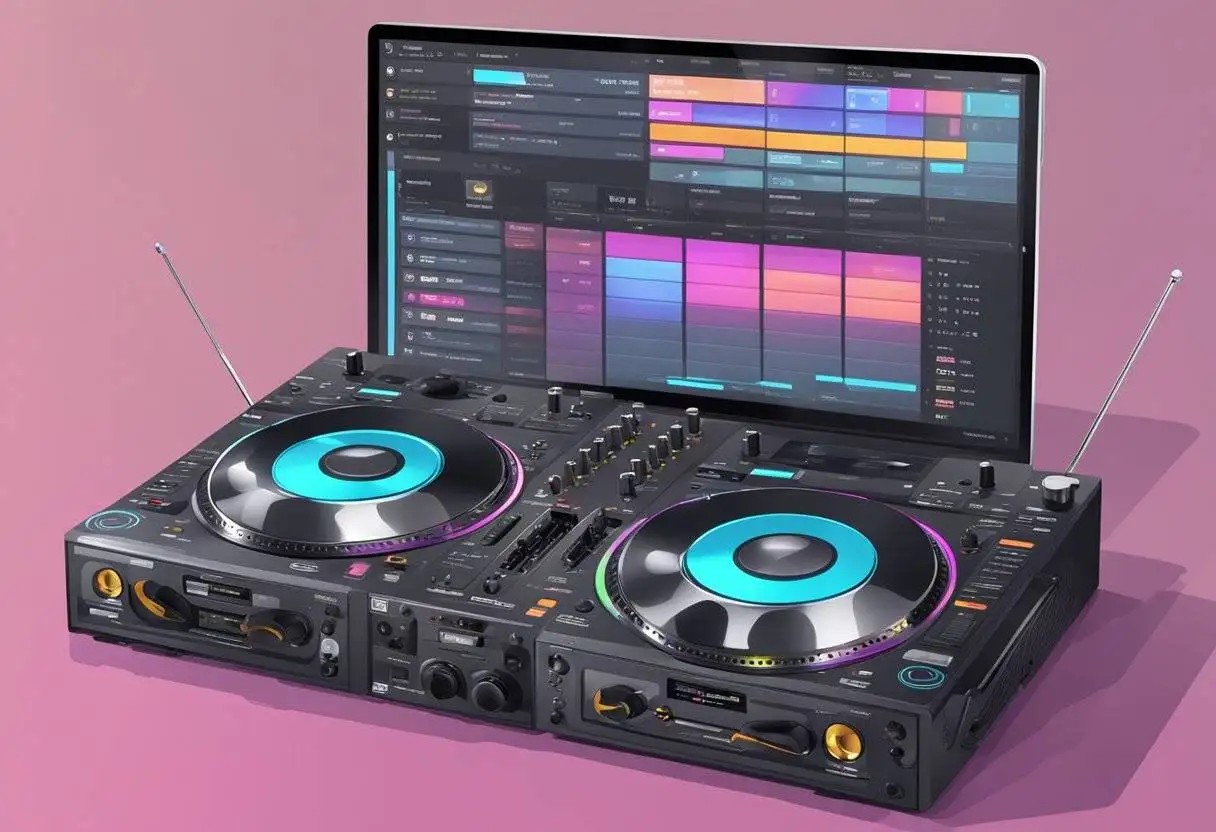Determining the hourly rate for a DJ is a crucial step when planning an event. DJ costs can vary considerably based on factors such as the type of event, the DJ’s experience, and the geographic location. For instance, a wedding might command a higher price than a casual private party due to the level of preparation and professionalism required. DJs might also charge different rates for corporate events, which often have unique requirements and expectations.

When hiring a DJ, it’s important to consider not just the hourly rate but also additional costs that could influence the total fee. These costs can include the DJ’s travel expenses, the need for specialized equipment, and the provision of extra services such as lighting or a photo booth. To avoid surprise expenses, it’s advisable to discuss all these aspects in advance and ensure they are included in the contract.
Key Takeaways
- A DJ’s hourly rate is influenced by the event type and their experience.
- Additional services and equipment can affect the overall cost of hiring a DJ.
- Clear communication and a detailed contract are essential when hiring a DJ.
Understanding DJ Costs
When considering the services of a DJ, I find it’s essential to understand the multiple components that contribute to their fees. Cost can vary greatly based on the details of the event and the experience of the DJ.
Factors Influencing DJ Pricing
The pricing of a DJ’s services is subject to a variety of factors. The type of event, such as weddings or corporate functions, often dictates the rate as each occasion requires different levels of preparation and expertise. Additionally, the length of the event plays a crucial role; a longer event will typically result in higher costs due to the extended performance time.
DJ equipment needs, like turntables, mixers, speakers, lighting, a fog machine, and even a dance floor, can also impact the bottom line. Moreover, liability insurance and costs for special requests (like rare tracks or performances) may add to the invoice. The DJ’s experience level also affects the rate, with well-known DJs commanding a higher fee.
Average Hourly Rates for DJs
The hourly rates for DJs can widely range depending on their expertise and the nature of the event. Here’s an outline of average costs for different types of DJs:
- Wedding DJ: A critical part of the reception, they often have prices that reflect their central role in the event’s success. Their rates typically range from $500 to $4,500 for the event.
- Club DJ: These DJs ensure patrons have a memorable night and usually charge based on the club’s size and expected crowd, with rates varying significantly.
- Mobile DJ: Geared towards private parties and smaller events, these DJs often offer package deals that can average $100 to $300 per hour.
Additional services like MC duties, dance floor lighting, and custom playlists can be negotiated separately. A beginner or party DJ just starting might charge a lower hourly fee as they build their reputation, while high-profile DJs, especially those with celebrity status, will have rates reflecting their demand and prominence.
The Different Types of DJ Services

When considering DJ services for an event, it’s crucial to understand the range of offerings available. The type of event and the atmosphere you’re aiming to create play significant roles in selecting the right DJ service.
Mobile DJs and Private Events
I’ve frequently seen Mobile DJs adapt to various private events such as birthday parties, anniversary celebrations, bar/bat mitzvahs, quinceañeras, and corporate gatherings. These DJs bring their equipment and music to set the tone for the event, catering to the specific musical theme requested by the client. For example, a wedding DJ might charge specifically for the extras like lighting displays and special mixes for the ceremony and reception, providing a complete package for a memorable day.
Club DJs and Residency
On the other hand, Club DJs often specialize in creating a vibrant atmosphere that keeps the dance floor active. These professionals might be part of a club’s regular lineup (residency), or they might be hired for a special appearance. Club DJs are experts in reading the crowd and mixing tracks on the fly, ensuring that the event’s energy remains high throughout the evening.
Professional Emcee Services
In addition to music, professional Emcee Services are a crucial component of many events. Emcees are responsible for engaging the audience, making announcements, and keeping the event on schedule. Whether it’s a corporate event DJ or someone leading the festivities at a prom, the emcee often sets the tone and flow of the occasion, ensuring everything runs smoothly.
Equipment and Additional Services

When booking a DJ, the cost often reflects not just the time spent performing but also the equipment used and additional services provided. In this section, I’ll detail what goes into standard DJ equipment, the extra flair added by lighting and sound enhancements, and how customization can align the experience with your personal vision.
Standard DJ Equipment
The backbone of my performance is my professional DJ equipment, which typically includes a mixer, turntables or controllers, headphones, and a laptop or media player. For events like weddings, high-quality equipment ensures that the music is seamless and the sound is crisp, no matter if I’m spinning vinyl records or using a digital format. This is essential for creating the right ambiance and ensuring guests enjoy themselves.
- Mixer: The central hub where all the music comes together.
- Turntables/Controllers: The devices I use to manipulate the music.
- Headphones: To cue and mix tracks accurately.
- Laptop/Media player: For accessing my comprehensive music library.
Lighting and Sound Enhancements
To elevate the experience, I offer various lighting and sound enhancements. These can range from simple spotlights to accentuate the dance floor to comprehensive setups with intelligent lighting capable of transforming a venue. To add a dramatic effect, I may use a fog machine to enhance the lights and create an immersive atmosphere.
- Intelligent Lighting: Automated lights that move and change colors to the music.
- Spotlighting: Focuses attention on key areas like the dance floor or the newlyweds at a wedding.
- Fog Machine: Adds depth to the lighting and creates a unique visual effect.
Customization and Personalization
I believe each event should reflect the host’s unique taste, which is why I offer custom playlists and rich personalization options. Clients have access to playlist planning portals to communicate their music preferences, including special requests for songs. For weddings, I work closely with the couple to understand their desired vibe, customizing everything from the walk-in music to the last dance.
- Custom Playlists: Tailored to the theme and preferences of the host or the event.
- Playlist Planning Portals: Online tools allowing clients to collaboratively build their event soundtrack.
- Special Requests: Ensuring those must-play songs are queued up and ready to captivate the crowd.
Hiring a DJ: Key Considerations
When considering hiring a DJ for an event, the first factor I examine is the type of event. Weddings, birthday parties, and corporate events each demand a unique approach and experience from the DJ. Wedding receptions, for example, often require a DJ skilled in handling both the ceremony and reception, with sensitivity to special traditions and moments.
Next, I focus on DJ cost. The fees can vary greatly depending on the DJ’s experience, demand, and the length of the event. For instance, DJ prices for a standard birthday party or corporate event typically range from $300 to $800 for basic services. However, for weddings, where the stakes are higher and the time commitment is often longer, the range could move upwards to $500 to $4,500, based on the specifics required.
The equipment that a DJ brings to an event is crucial as it can impact the sound quality and overall atmosphere. When I hire a DJ, I ensure they have professional-grade equipment that suits the event size and venue. Importantly, I also discuss whether any additional equipment might be necessary, which can influence the overall cost.
Lastly, I consider if I need any custom playlists and whether the DJ can accommodate my music preferences. I find that DJs often charge extra for this personalization, so it’s important to discuss these details upfront.
In summary, carefully considering these aspects helps me to budget appropriately and find a DJ who can truly enhance the event experience.
Frequently Asked Questions
When considering hiring a DJ, it’s crucial to understand the diverse factors that affect the pricing, which vary widely based on event type, the DJ’s experience, and other specific details of the service provided.
What are the typical rates for a DJ to perform at a wedding?
The rates for a DJ to play at weddings range from $500 to $4,500, reflecting the importance and scale of the event, as well as the extensive experience many wedding DJs possess.
What factors influence the cost of hiring a DJ for a birthday celebration?
Factors affecting the cost of a DJ for a birthday include the length of the event, the size of the venue, additional services like lighting and sound equipment, and the DJ’s expertise. Expect to see prices varying between $300 to $800 on average for such personal celebrations.
How are pricing structures generally determined for DJs at private parties?
For private parties, pricing structures are usually hourly, with DJs charging anywhere from $75 to $200 per hour. These rates can be influenced by the event’s duration, location, and the level of customization required by the client.
What do DJs typically charge to provide entertainment for a quinceañera?
Quinceañeras often require specialized music and announcements, leading to prices similar to wedding DJ rates, typically in the $500 to $4,500 bracket, depending on the individual requirements and scale of the event.
What additional expenses should be considered when setting up a professional DJ system?
Beyond the performance fees, a professional DJ system setup might require payment for additional equipment, transport costs, setup and breakdown time, and potential overtime rates. These can add significant amounts to the base cost of the DJ’s services.
What can one expect to pay for a high-profile or celebrity DJ’s performance?
For high-profile or celebrity DJs, performance fees can soar into the tens of thousands, with headline acts such as Calvin Harris commanding $75 million. These figures illustrate the premium placed on DJs with international recognition and draw.
